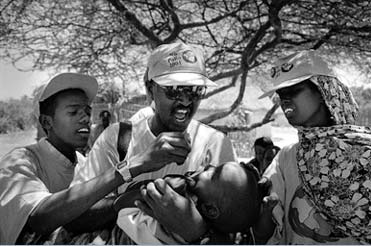
The Global Polio Eradication Initiative requires a multi-pronged strategy to reach all unprotected children – including 132 million born each year – with oral polio vaccine.
Routine immunization is the Initiative's cornerstone, and a fundamental part of overall public health. Ideally, countries should reach at least 90 per cent of children under one with four doses of polio vaccine. These should be part of comprehensive immunizations against the six other major vaccine preventable childhood diseases: diphtheria, pertussis, neonatal tetanus, measles, tuberculosis and hepatitis B.
In many countries, these vaccinations cover almost all children in their first months of life. But other countries, most of them very poor, cannot reach the 90 per cent threshold. For example, in the early 1990s, India's national polio immunization programme only covered 14 per cent of children in some areas. To boost and maintain high routine immunization, the Initiative helps supply countries with adequate amounts of polio vaccine, as well as with freezers and other equipment. It also helps train personnel and inform communities about the benefits of vaccination so that parents do not merely accept it for their children but demand it.
As the Initiative succeeded and new polio cases plummeted in the late 1990s, another challenge emerged: sustaining routine immunization in polio-free countries. Lapses have led to outbreaks in some countries through the importation of the virus. In 2000, Cape Verde had been polio-free for more than a decade, but routine immunization was sporadic. A virus carried by a traveller from Angola to the island nation left 44 people paralysed and 17 dead. In 2001, Bulgaria and Georgia suffered similar, but much smaller, outbreaks – showing that polio can be just a plane ride away.

© Sebastião Salgado
Somalia
Polio immunizers encourage a child to accept a dose of oral polio vaccine in the town of Bardale during the March 2001 National Immunization Days. Endemic conflict in the country has decimated basic health services like routine immunization.
 |